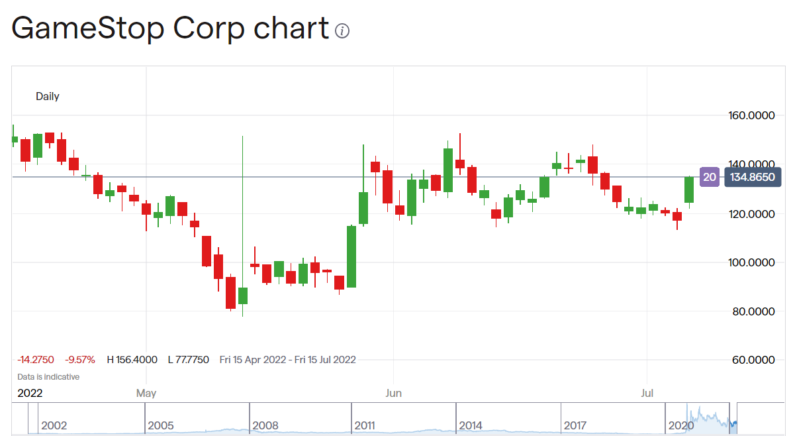Key points:
- Meme stocks can be strange places to trade
- GameStop jumped 15% yesterday on the purely nominal change of a stock split
- Then it fell 5% this morning on real business changes
GameStop (NYSE: GME) stock is living up to its hard won reputation for volatility as GME rose 15% yesterday on the back of the stock split news, now it is down 5% again this morning on the CFO firing and news of large layoffs. It's also true that this isn't quite how we would expect a share price to move if we were doing fundamental analysis. A stock split should have no effect upon real prices, while changes within the business that reduce costs should boost, not lower, a stock price. All of which is a useful reminder that meme stocks are more about sentiment than they are fundamental analysis.
As we pointed out yesterday there was a GameStop stock split announced. Given that this is merely a paper shuffling exercise it should make no difference to the real price of the company – the market capitalisation. But if that were true then no one would ever do stock splits so clearly there's something else going on. That just being fashion. The New York markets just think that the “right” price for a stock is in the $10 to $100 range. So, when a stock price goes over that split each piece of stock into many in order to lower the nominal, not real, price. If it's true, that statement about fashion, then doing so could make the stock price rise overall.
Which is what happened with the GameStop stock split. Just changing the nominal value increased the real market capitalisation by 15% – which is pretty good going really.

Also read: What Happened To Meme Stocks?.
Then last night we got the news of significant layoffs at GameStop and the firing of the CFO. Given that the company just lost $150 million and change, even given the switch in business focus, this might be thought of as positive news for the company. A change in the actual business approach, a fundamental change even. But at this point the GameStop stock price declines 5%. It's not obvious, to put it mildly, that trading in, or valuations of, GameStop are being done on entirely rational grounds.
But then this has long been true of meme stocks. Except with GameStop there was considerable rationality in the original price movements. By some measures more than 100% of the stock was on loan to short sellers. Certainly it could be calculated that 100% of the free float was. That's a lovely time for a short squeeze and squeezed the shorts were (which is about as painful as that sounds to those with the male physique). The big difference was that the short was not organised, it rather coalesced from places like r/wallstreetbets.
It's at Reddit that we find the copy of the internal GameStop memo. The thing about that is that the actual news in it is the sort of thing that fundamental stock valuations would regard as positives. The CFO goes – well, performance hasn't been great. They've been on a hiring spree so now they're going to moderate that. They're going to be investing in the actual store teams.
So, we get a nominal change which increases real value by 15%, then a fundamental business change which can be seen as positive and a 5% stock price fall. GameStop and other meme stocks aren't, as we note above, really traded on fundamental analyses.




